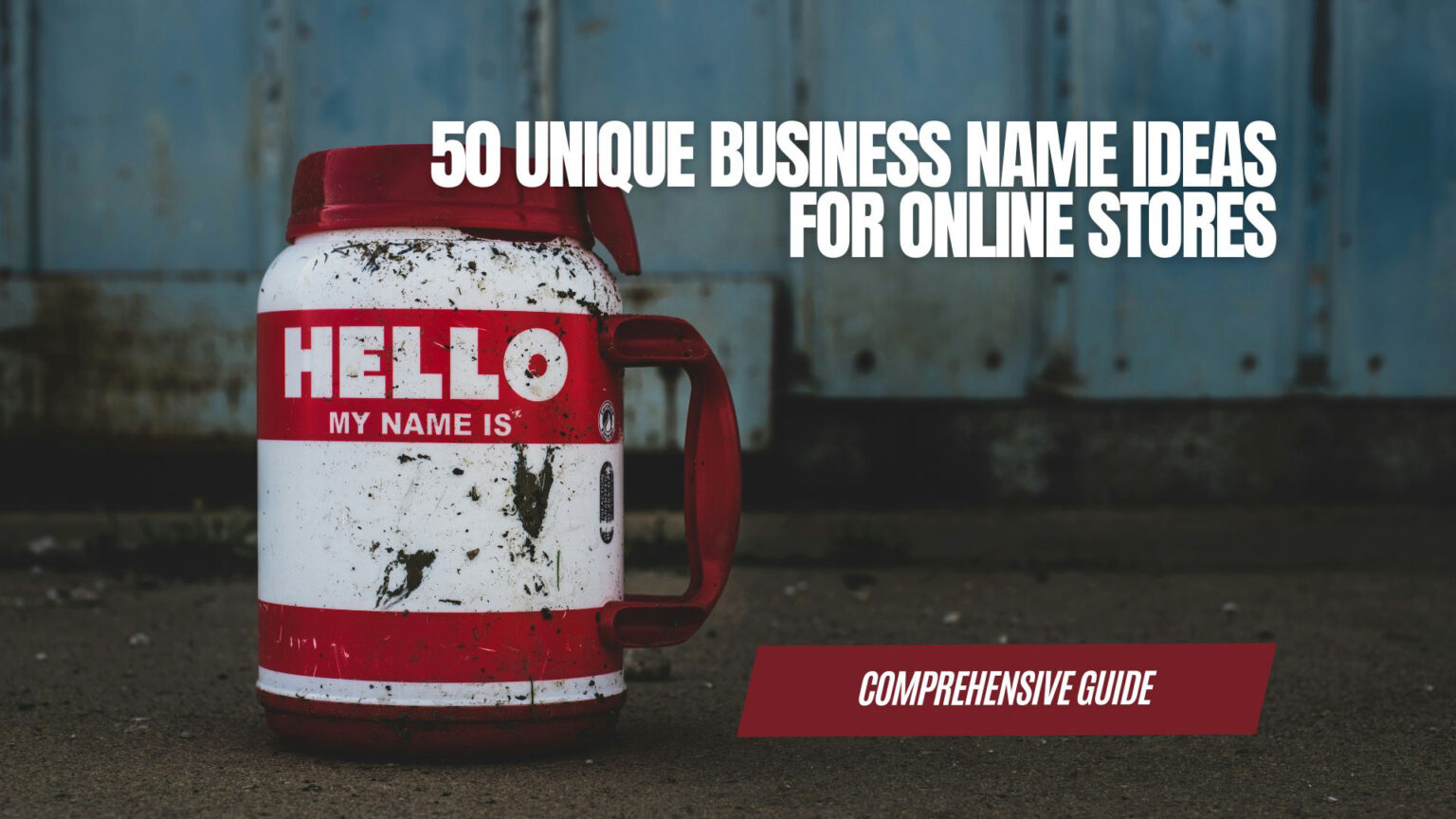Your online store’s name is more than just a label – it’s your first opportunity to make a lasting impression on potential customers. A strong, memorable name immediately tells shoppers who you are and what you’re about, helping them decide if your store is right for them. In today’s crowded online marketplace, a unique name is essential. It helps your business stand out from competitors, making it easier for customers to find you and remember you.
A well-chosen name does even more than that. It can make your website easier to find through search engines, and it can help you secure a great website address that matches your brand. In this article, we’ll explore the benefits of a distinctive name and provide you with 50 creative ideas to spark your imagination.

Naming Considerations
Disclosure: I may earn a commission for qualifying purchases or subscriptions through my links in this content. This helps support my work, but my opinions are independent, not influenced by any affiliate partnerships.Choosing the right name for your online store requires careful thought and consideration. Here are key factors to keep in mind:
Target Audience
Consider your store’s target audience when choosing a name. To attract the right people, think about their age range, interests, lifestyle, and sense of humor.
For example, the name “Forever 21” perfectly reflects the brand’s focus on young, fashion-forward individuals who want to stay on top of the latest trends. The name exudes youthfulness and energy, aligning with the desires and aspirations of their customer base.
On the other hand, a store selling high-end luxury watches wouldn’t suit a name like “Forever 21.” Instead, a name like “Timeless Treasures” would better connect with their target audience of affluent individuals who appreciate craftsmanship and prestige.
Remember:
- If you’re targeting a younger audience, you might opt for a name that’s trendy, playful, or even a bit edgy.
- For an older demographic, a name that feels more established, classic, or sophisticated might be a better fit.
- If your products cater to a specific niche (e.g., outdoor enthusiasts, gamers, eco-conscious consumers), incorporate language that speaks directly to their interests.
Your store name is like a handshake with your potential customers. Make sure it’s a handshake they’ll want to return.

Product or Niche
Your store name should act as a subtle signpost, guiding customers towards what you offer. It doesn’t need to be a blatant declaration of your inventory, but rather a gentle nudge in the right direction.
Take the example of “The Spice Merchant.” This name immediately conjures images of exotic aromas, flavorful blends, and a curated selection of spices from around the world. It sets the expectation for customers without needing to explicitly state, “We sell spices.”
Similarly, “The Paper Trail” could be a charming name for a stationery store, hinting at notebooks, pens, and all things paper-related. “The Yarn Haven” clearly caters to knitters and crocheters, while “The Gadget Guru” promises a treasure trove of tech-related goodies.
Real-World Inspiration:
- Warby Parker: This eyewear brand’s name is quirky and memorable, but it doesn’t directly reference glasses. Instead, it evokes a sense of individuality and style, perfectly aligning with their product offering.
- Lush: This cosmetics company’s name evokes images of rich, natural ingredients and sensory experiences, hinting at their focus on handmade, cruelty-free products.
- REI (Recreational Equipment, Inc.): This outdoor retailer’s acronym-based name is simple and straightforward, immediately communicating their niche to their target audience.
Tips:
- Brainstorm keywords: Start by listing words associated with your products or niche. Then, play around with synonyms, related terms, and creative combinations.
- Use imagery: Consider words that evoke the senses (e.g., “The Velvet Touch” for a fabric store) or create a visual picture in the customer’s mind.
- Don’t be afraid to get creative: While clarity is important, a touch of wordplay or a unique twist can make your name even more memorable.
Remember, your store name is a powerful tool for attracting the right customers and setting the stage for their shopping experience. Make it count!
Brand Personality

Your store name isn’t just about what you sell; it’s about how you sell it. It’s the embodiment of your brand’s unique personality, values, and overall vibe.
Think of it like this:
- Anthropologie: Their name, evoking a sense of worldliness and anthropology, perfectly matches their eclectic mix of bohemian clothing, home décor, and gifts. It transports shoppers to a curated marketplace filled with unique finds.
- Apple: This tech giant’s name is simple, modern, and approachable, just like their products. It reflects their focus on user-friendly design and innovative technology.
- Patagonia: Their name, inspired by the rugged, natural beauty of Patagonia, perfectly aligns with their commitment to environmental sustainability and outdoor adventure.
Finding Your Brand Voice:
- Playful & Quirky: If your brand is lighthearted and fun, consider names with puns, alliteration, or unexpected word pairings. Think “The Fuzzy Pineapple” for a novelty gift shop or “The Whimsical Wardrobe” for a children’s clothing store.
- Sophisticated & Elegant: For a luxury brand, choose a name that sounds refined and timeless. Consider words like “couture,” “atelier,” or “curated.” Examples include “The Luxe Loft” or “The Gilded Gallery.”
- Eco-Conscious & Minimalist: If your brand is focused on sustainability and simplicity, opt for a name that reflects those values. Think “The Green Goods Co.” or “The Eco Edit.”
Why It Matters:
Your brand personality should permeate every aspect of your business, from your product descriptions to your social media presence. Your store name is the first step in establishing that personality and creating a cohesive brand identity that resonates with your target audience.
By choosing a name that accurately reflects your brand’s unique personality, you’ll attract the right customers and build a loyal following of people who connect with your values and aesthetic.
Domain Availability
Think of your domain name as your online storefront’s address. It’s how customers will find you on the web, so it’s crucial to choose one that’s easy to remember and accurately reflects your brand.
Why It Matters:
- Memorability: A domain name that matches your store name is easier for customers to recall and type into their browser.
- Credibility: A unique, brand-specific domain name adds a layer of professionalism and legitimacy to your online store.
- Branding: A matching domain reinforces your brand identity and makes it easier for customers to connect with your business online.
- SEO: While not the most critical factor, a domain name that includes relevant keywords can potentially help your website rank higher in search engine results.
Checking Availability:
Before you fall in love with a name, use a domain name checker to see if it’s available. There are many free tools online, including Namecheap’s domain search tool.
Simply type in your desired name and the tool will tell you if it’s available to register. If it’s taken, it will often suggest similar available options.
Tips:
- Be flexible: If your exact match isn’t available, don’t despair! Try variations by adding a word (e.g., “shop” or “store”), using a hyphen, or switching up the word order.
- Consider different extensions: If .com isn’t available, look into other relevant extensions like .shop, .store, .online, or even niche-specific extensions like .art or .design.
- Think long-term: Choose a domain name you can grow with. Avoid anything too trendy or limiting that you might outgrow in a few years.
Example:
Imagine you want to name your online vintage clothing store “The Retro Revival.” If “theretrorevival.com” is taken, you could try:
- retro-revival.com
- theretrorevival.store
By being creative and flexible, you can find a domain name that’s both unique and memorable.

Legal Considerations
Protecting your business starts with choosing a name that won’t land you in legal hot water. Failing to do your due diligence can result in costly rebranding efforts or even lawsuits down the line.
Why It Matters:
- Trademark Infringement: Using a name that’s too similar to an existing trademark can result in a cease-and-desist letter or even a lawsuit.
- Customer Confusion: A name that’s easily confused with another brand can harm your reputation and lead to lost customers.
- Domain Disputes: If your domain name infringes on someone else’s trademark, you could be forced to give it up.
Actionable Research Steps:
- Trademark Search:
- United States Patent and Trademark Office (USPTO): Start with the USPTO’s Trademark Electronic Search System (TESS) database. Search for your desired name and any variations of it.
- State Trademark Databases: Many states also have their own trademark databases. Check these to see if your name is registered at the state level.
- International Trademark Databases: If you plan to do business internationally, consider searching global trademark databases.
- Domain Name Search:
- Use a domain registrar’s search tool (like Namecheap) to see if your desired domain name is available.
- WHOIS Lookup: Use a WHOIS lookup tool to see who owns similar domain names. This can give you an idea of whether there are established businesses with similar names.
- Internet Search:
- Do a general web search for your desired name and any variations of it. Look for businesses with similar names, especially in your industry.
- Social Media Search: Check if the name is available on social media platforms you plan to use.
- Legal Consultation:
- If you’re unsure about the legality of a name, consult with an intellectual property attorney. They can help you assess the risks and make an informed decision.
Remember:
- Even if a name isn’t trademarked, it could still be problematic if it’s too similar to an existing brand.
- Be thorough in your research. The time you invest now can save you significant headaches later.
- When in doubt, err on the side of caution and choose a different name.
By taking the necessary precautions, you can protect your business and avoid costly legal disputes.

50 Unique Business Name Ideas
Catchy & Creative Business Name Ideas
These names are memorable, often using wordplay or puns to make them stick in customers’ minds.
- The Clever Clove (kitchen tools)
- Sole Mate (shoes)
- The Pixelated Palette (art supplies)
- The Word Weaver (writing/editing services)
- Knit Wit (yarn and knitting supplies)
- The Perky Percolator (coffee and tea)
- The Barking Lot (pet supplies)
- Threadbare & Co. (clothing)
- The Bookish Bandit (books)
- The Lit Wick (candles)
Niche-Specific Business Name Ideas
These names directly relate to the products or services offered, making it clear to customers what they can expect.
- The Vegan Vault (vegan products)
- The Wanderlust Wardrobe (travel clothing)
- The Tech Haven (electronics)
- The Eco Edit (sustainable goods)
- The Plant Parent Club (houseplants and gardening supplies)
- The Bark Avenue Boutique (dog accessories)
- The Crafty Corner (art and craft supplies)
- The Gamer’s Grotto (video games and accessories)
- The Fit Foodie (health food)
- The Bookish Box (book subscriptions)

Evocative & Imaginative Business Name Ideas
These names evoke a feeling, image, or experience, creating a sense of intrigue and wonder.
- The Serendipity Shoppe (gifts and curiosities)
- The Aurora Atelier (art or jewelry)
- The Whispering Woods (natural products)
- The Moonlight Market (boho clothing/accessories)
- The Cozy Corner (home goods)
- The Wanderer’s Way (travel gear)
- The Sun & Moon Studio (yoga/wellness)
- The Enchanted Emporium (magical/fantasy themed)
- The Harmony Haven (spa or relaxation products)
- The Dream Weaver’s Den (bedding/sleep products)

Modern & Trendy Business Name Ideas
These names use current slang, trends, or buzzwords to appeal to a younger, more fashion-conscious audience.
- The Hype House (streetwear)
- The Vibe Vault (vintage clothing)
- The Drip Drop (fashion accessories)
- The Social Status (influencer-curated items)
- The Slay Station (beauty products)
- The Flex Zone (athleisure)
- The Mood Board (home décor)
- The Aesthetic Agenda (art prints)
- The Trend Tribe (curated fashion)
- The Gram Glam (photography accessories)
Sophisticated & Classic Business Name Ideas
These names feel timeless, elegant, and high-end, suggesting quality and exclusivity.
- The Curated Collection (curated goods)
- The Artisan Atelier (handmade items)
- The Gilded Gallery (art or jewelry)
- The Élan Ensemble (luxury fashion)
- The Velvet Vault (vintage accessories)
- The Ivory Tower (books or antiques)
- The Apothecary Archive (natural skincare)
- The Luxe Loft (home décor)
- The Bespoke Boutique (custom clothing)
- The Connoisseur’s Corner (gourmet food/wine)

Tips for Brainstorming Your Business Name
While the lists above offer inspiration, finding the perfect name often requires digging deeper into your own creativity. Here are some proven brainstorming techniques:
Word Association
Start by jotting down keywords related to your business, products, niche, or brand personality. Then let your mind wander and write down any words that come to mind – even if they seem unrelated at first. Explore synonyms, antonyms, and tangential concepts. This free association can often lead to unexpected and interesting combinations.
How It Works (The Science Behind It):
Word association is a powerful brainstorming technique that taps into the intricate networks of your brain. It involves starting with a core concept (in this case, your business or product) and then letting your mind freely explore related words and ideas.
When you think of a word, your brain activates a complex network of interconnected concepts. These connections are based on various factors, including meaning, sound, experience, and emotion. Word association leverages these neural pathways to stimulate creative thinking.
As you allow your mind to wander, you might stumble upon seemingly unrelated words that, upon closer inspection, reveal hidden connections to your original concept. These unexpected associations can spark innovative ideas that you might not have discovered through a more structured approach.
Example: Brainstorming for a Sustainable Clothing Store
Let’s say you’re starting an online store that sells sustainable clothing. Here’s how word association might play out:
- Core Concepts: Sustainable, clothing, eco-friendly, fashion, ethical.
- Branching Out: Green, natural, organic, renew, recycle, repurpose, conscious, mindful, earth, planet, style, trend, minimalist, capsule, wardrobe, timeless, quality.
- Unexpected Connections: Bloom (from “organic”), thread (from “clothing”), revive (from “renew”), conscious closet (from “conscious” and “wardrobe”).
- Potential Names: The Blooming Thread, Revive Apparel, The Conscious Closet, Earth Style, Planet Fashion, The Minimalist Wardrobe, Timeless Threads.
Tips for Effective Word Association:
- Don’t censor yourself: Write down every word that comes to mind, even if it seems silly or unrelated.
- Embrace the tangents: Follow your thoughts wherever they lead. Sometimes the most interesting ideas come from unexpected places.
- Use visual aids: Create a mind map or word web to visually represent the connections between your words and ideas.
- Collaborate: Brainstorm with others to expand your pool of associations and get fresh perspectives.
Word association is more than just a brainstorming technique; it’s a way to unlock your creative potential and discover unique and compelling names that capture the essence of your business.
Use a Thesaurus: Expanding Your Vocabulary for a Richer Name
A thesaurus is a powerful tool that can elevate your brainstorming from basic to brilliant. It’s like a treasure trove of words, revealing synonyms, related terms, and even antonyms (opposites) that you might not have considered.
What is a Thesaurus?

A thesaurus is a reference book (or online tool) that groups words together based on their meanings. It’s different from a dictionary, which defines individual words. Instead, a thesaurus helps you find alternative words that convey similar nuances or shades of meaning.
Why Use a Thesaurus for Naming?
- Find the Perfect Fit: The right word can make all the difference in capturing your brand’s essence. A thesaurus can help you discover words that are more precise, evocative, or simply more interesting than your initial choices.
- Elevate Your Language: Instead of settling for generic terms, a thesaurus can help you find words that are more sophisticated, elegant, or unique.
- Avoid Repetition: If you’re stuck in a rut with the same few words, a thesaurus can introduce fresh options and new perspectives.
Example: Brainstorming for a Bookstore Name
Let’s revisit the bookstore example, but this time, we’ll use a thesaurus to enhance our word choices:
- Initial Keywords: Book, store, read, literature, novel, page.
- Thesaurus Exploration:
- Book: Tome, volume, manuscript, work, publication.
- Store: Shop, emporium, boutique, bazaar, haven.
- Read: Peruse, devour, browse, immerse.
- Literature: Fiction, prose, narrative, storytelling.
- Novel: Story, tale, narrative, chronicle.
- Page: Leaf, sheet, folio, chapter.
- Refined Name Options:
- The Literary Emporium
- The Novel Nook
- The Page Turner’s Haven
- The Storyteller’s Bazaar
- The Prose Perusal
By incorporating more nuanced and evocative words from the thesaurus, we’ve created name options that are more intriguing and better reflect the bookstore’s atmosphere and offerings.
Online Thesauruses:
If you don’t have a physical thesaurus handy, there are plenty of excellent online resources, such as:
- Thesaurus.com: A comprehensive online thesaurus with a user-friendly interface.
- Merriam-Webster Thesaurus: A reliable resource from a trusted dictionary publisher.
By utilizing a thesaurus, you can transform your list of simple keywords into a collection of captivating and unique names that truly represent your brand.
Combine Words
Don’t be afraid to experiment with merging unexpected words or phrases. This can create a truly unique and memorable name.
Example:
“The Bookish Bean” could be a charming name for a bookstore that also serves coffee. “Pixel & Ink” could work for a store that sells both digital art prints and stationery.

Use Online Business Name Generators
Online name generators can be a helpful starting point, but use them with caution. While they can spark ideas, they often produce generic or uninspired results.
Here are a few to try:
- Shopify Free AI Business Name Generator: A user-friendly tool that generates names based on your keywords.
- Namelix: Uses artificial intelligence to create short, brandable names.
- Business Name Generator: Offers a variety of filters and options for generating names.
Remember to treat these tools as a springboard for your own creativity, rather than a definitive source for your final name.
Get Feedback
Once you’ve narrowed down your list of potential names, get feedback from trusted friends, family, or even potential customers. Ask them which names resonate most, which ones are easy to remember, and which ones best reflect your brand. Be open to constructive criticism and use their feedback to refine your choices. Combine these brainstorming techniques with being open to new ideas, and you will be well on your way to finding the perfect name for your online store.

Additional Tips & Considerations to Craft a Business Name
You’ve brainstormed a killer name that’s memorable, unique, and reflects your brand. But before you hit the “launch” button, here are some extra details to keep in mind:
Domain Extensions
While the classic “.com” extension is often preferred, it might not always be available for your chosen name. Thankfully, there’s a whole world of domain extensions to explore:
- .shop: Perfect for online stores, giving customers a clear indication of your business model.
- .store: Another excellent option for e-commerce businesses.
- .online: A versatile choice that works for a variety of online ventures.
- Industry-Specific Extensions: Depending on your niche, you might consider extensions like .fashion, .tech, .art, or .beauty.
Remember, the best extension is one that is both available and relevant to your brand.
Social Media Handles
Your online store’s name doesn’t exist in a vacuum. It’s part of a broader online presence, including your social media accounts. Before finalizing your name, check if it’s available as a handle (username) on all the platforms you plan to use.
Consistency is key for brand recognition. Ideally, you want your social media handles to match your store name exactly or as closely as possible. This makes it easier for customers to find and follow you across different platforms.
Logo Design

A great name is even more impactful when paired with a visually appealing logo. Your logo serves as the visual cornerstone of your brand, instantly communicating your identity and values. It should harmonize with your store name, creating a cohesive and memorable brand experience.
If you lack design expertise, there are options available to help you achieve a professional look:
- Hire a Professional: Graphic designers specialize in crafting logos that capture the essence of a brand. Platforms like Fiverr offer access to a diverse pool of talented designers at various price points.
- DIY with a Logo Maker: For a more budget-friendly option, consider using an online logo maker like Fiverr Logo Maker. These tools offer customizable templates and design elements, allowing you to create a decent logo without design skills.
- Crowdsource: Some platforms allow you to run a contest for logo designs, receiving multiple options from different designers to choose from.
A well-designed logo can make your online store look more polished and professional, signaling to customers that you’re serious about your business. It also fosters a sense of trust and loyalty, making shoppers more likely to return.
Additional Tips:
- Say it out loud: Practice saying your name and potential logo combinations aloud. How do they sound together? Are they easy to pronounce and remember?
- Get feedback: Before finalizing your name and logo, gather feedback from friends, family, or potential customers. Their insights can be invaluable in identifying any potential issues or areas for improvement.
- Consider future growth: Choose a name and logo that are flexible enough to accommodate potential changes or expansions to your business. Avoid anything too niche or limiting that might not suit your evolving brand.
Investing time and effort in choosing the right name and logo will pay dividends in the long run. They’ll help you establish a strong brand identity, attract the right customers, and ultimately drive sales for your online store.
Pay attention to these additional details to ensure that your online store’s name not only looks good on paper but also translates into a successful online presence.

Final Thought
Your online store’s name is more than just a few words strung together. It’s a powerful tool that can shape your brand identity, attract your ideal customers, and ultimately drive the success of your business.
Invest time and thought into choosing a name that’s unique, memorable, and reflective of your brand’s personality. You’re not just creating a label – you’re crafting a story. This story will resonate with your target audience, making them feel connected to your business and eager to explore what you have to offer.
Remember, there’s no one-size-fits-all formula for the perfect name. It’s about finding the right combination of creativity, strategy, and authenticity that speaks to your vision and values.
Don’t rush the process. Take your time, brainstorm ideas, explore different options, and get feedback from others. The perfect name is out there, waiting to be discovered. It’s an investment that will pay off in the long run, helping you build a thriving online store that stands out from the crowd.















